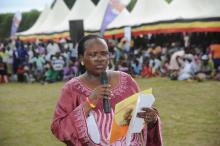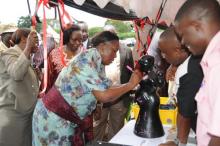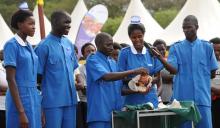Uganda Commemorates Safe Motherhood Day 2013
Kampala, 22nd October 2013 -- For the 8th consecutive year, Uganda commemorated the Safe Motherhood Day with weeklong activities that culminated into a national function held in Apac district. The function was presided over by the Speaker of Parliament The Right Honourable Rebecca Alitwala Kadaga under the theme “Teenage Pregnancy an obstacle to Safe Motherhood: Let us stop it now”.
It was a pertinent theme given that Uganda has one of the highest teenage pregnancy rates in Sub-Saharan Africa. According to Uganda Demographic Health Survey (UDHS 2011), 24% of adolescent girls in Uganda become pregnant before the age of 19.
This has grave implications especially because adolescents are likely to suffer from a number of health problems during pregnancy because their bodies are not yet physically mature to carry a pregnancy to full term. Such problems include anaemia, severe forms of malaria, difficult labour, pregnancy induced hypertension, fistula, low birth weight babies, stillbirths, and death for the neonate and the mother.
Because most adolescent pregnancies are unwanted, there is high temptation for abortion. Statistics show that about 15 to 23 percent of female youths aged between 15 and 24 have had an abortion. In addition, 13 percent of maternal deaths and 27.8 percent of deaths among adolescents in Uganda are primarily due to unsafe abortions.
There is a major concern here because abortion is illegal in Uganda. In most cases, abortions are performed by untrained people in unsafe conditions as most of the adolescents cannot afford the safe abortions by skilled health workers. This greatly increases the risk of disability, and death that contributes to Uganda’s unacceptable high maternal mortality rate.
Reflecting on the theme, Honourable Kadaga advised teenagers to abstain from sex, concentrate on studies and stay longer in school as one of the best ways of avoiding teenage pregnancies. At the same time, Honourable Kadaga castigated some parents who marry off their adolescent daughters instead of living them in school and local leaders who fail to address the problem in their localities.
Honourable Kadaga informed the public that one of the cardinal objectives of the current 9th Parliament which must be achieved if everything else fails is to solve the problem of high maternal mortality in Uganda. She therefore enumerated a number of measures undertaken by the Government of Uganda which, if implemented, will go a long way in addressing the underlying determinants of teenage pregnancies and lead to the attainment of the parliamentary objective.
But addressing the underlying determinants of the Teenage pregnancies is a collective effort. It is critical that the different actors play their role in stopping the vice.
Indeed this point was emphasised by the Minister of State for Health (Primary Health Care ) Honourable Sarah Opendi who said: “We need a platform where all stakeholders focus more on preventing the causes of teenagepregancies and their consequencies. One of the key platforms is to advocate for the youth to abstain from early sexual engagements. Others are: attending and completing school, preventing early marriages and accessing youth friendly services for inormation and counselling”.
Luckily, Sexual and Adolescent Health is one of the priority programs of the Ministry of Health as spelt out in the Health Sector Strategic and Investment plan (HSSIP). The HSSIP lays out strategies and actions for various stakeholders to address the Reproductive Health for all segments of society including the adolescents leading to improved outcomes.
This fact was not lost on the UNFPA Resident Representative Ms Esperance Fundira who represented the United Nations family at the commemoration. She called for “a social movement to prevent forced early-marriages and teenage pregnancies” adding that “in this social movement, everybody and every institution is responsible and has a role to play in preventing, managing and mitigating teenage pregnancy and forced early-marriages.
Ms Fundira also made a promise and a commitment to the Government of Uganda and its adolescents. “The UN stands ready to partner with you all and the key stakeholders in making our contribution to address the problem of teenage pregnancy and forced early-marriages in Uganda. In this way, we can drastically reduce maternal deaths by reducing the number of girls who become pregnant, and thereby promote safe motherhood” she said.
On their part, Apac district leaders and politicians requested for urgent rehabilitation of the district hospital, functionality of health centre IVs, in addition to proper equipping and adequate staffing. Honourable Kadaga who later visited the hospital agreed to these requests and promised to forward them to the appropriate authorities.
Ultimately it is the Government of Uganda that must ensure that the quality of health services is improved and that youth friendly services are availed to all. Six core messages delivered by Honourable Sarah Opendi encapasulated this commitment:
• All adolescents must abstain from sex until they are old enough (over 18 years)
• Schools should provide sexuality education to students starting from upper primary in order to help them manage different peer pressures that influence them to early sex practicing
• Say no to early sexual relationships.
• Young mothers should be encouraged to go back to school.
• All pregnant teenagers must attend at least 4 Antenatal Care visits to monitor the pregnancy and guidance on birth preparedness.
• All pregnant teenagers should deliver under skilled care that is a midwife or doctor in a health facility where it is easier to access emergency obstetric care in case of complications during childbirth
As if on cue, all the exbitions and services offered at the commemoration venue revolved around these messages. To the adolocsents the messages were: delay sex; delay marriage; and delay first pregnancy and these will be repeated at every opportunity thoughout the year. It is hoped that this will lead to a Uganda where every pregnancy is wanted, every childbirth is safe and every young person’s potential is fulfilled.
________________________________________________________________
For more information please contact :
Benjamin Sensasi, Health Promotion Advisor,
WHO Country Office Tel 256-414-335500
Email: sensasib [at] ug.afro.who.int (sensasib[at]ug[dot]afro[dot]who[dot]int)









